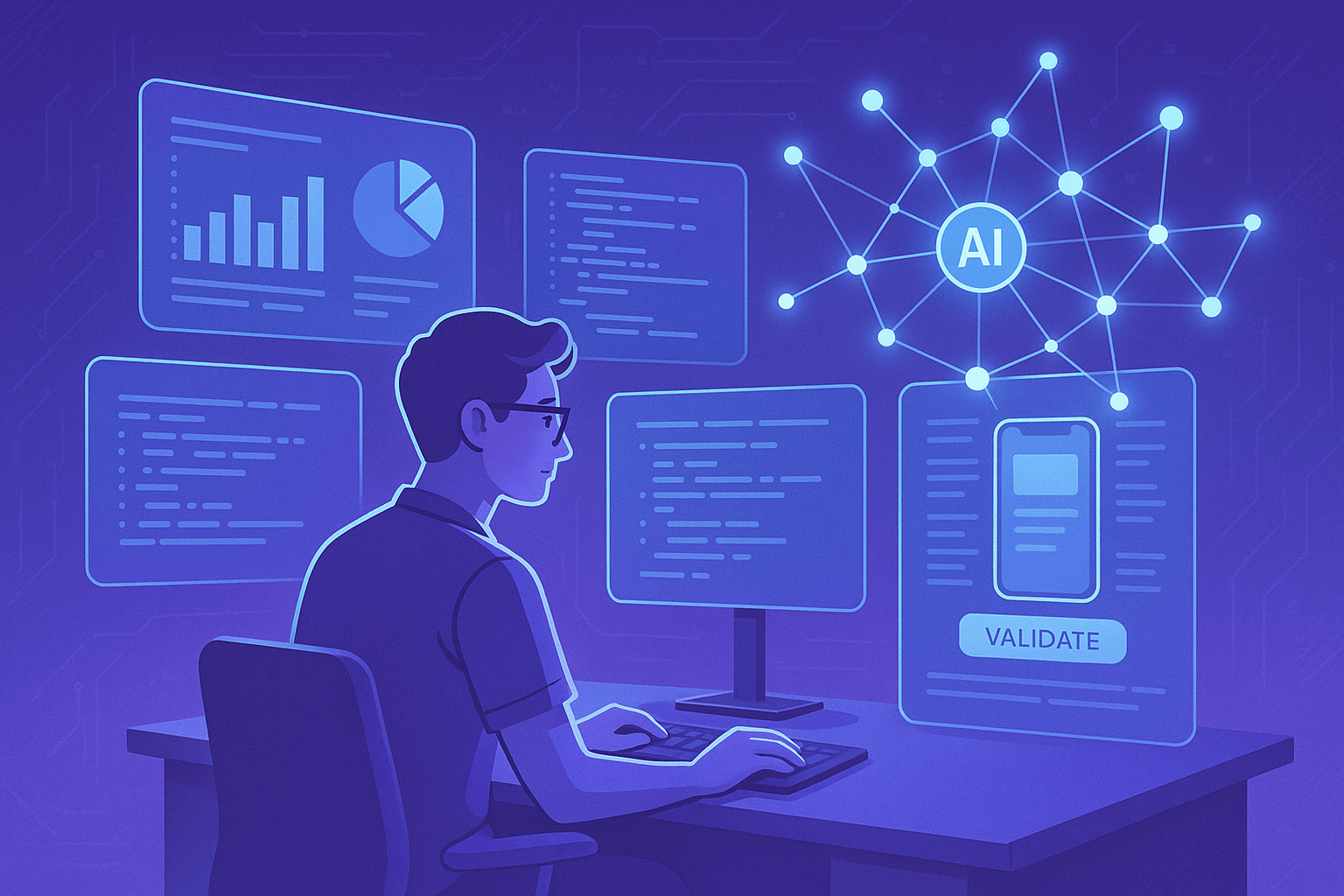Validating Startup Idea with AI-Enabled Development

In today’s fast-paced tech landscape, founders face the critical challenge of validating their startup ideas quickly and efficiently. With the emergence of AI-enabled development tools, there’s a new paradigm for testing, iterating, and launching innovative solutions. This post explores how founders can leverage AI to accelerate their validation process while maintaining quality and managing resources effectively.
The Modern Founder’s Validation Challenge
Tech founders traditionally face several key hurdles when validating new ideas:
- Limited resources and runway to test assumptions
- High development costs for building prototypes
- Pressure to reach market quickly before competitors
- Need for quality despite rapid development cycles These challenges have historically forced difficult trade-offs between speed, quality, and cost. However, AI-enabled development is changing this dynamic.
Accelerating MVP Development with AI Tools
AI development tools are revolutionizing how founders approach their initial prototypes:
- Code generation tools that automate boilerplate development
- AI-powered testing frameworks that identify issues early
- Natural language to code converters for rapid prototyping
- Automated code review and optimization tools These capabilities can reduce initial development time by 40-60% while maintaining high code quality standards.
Data-Driven Iteration Strategies
Successful validation requires systematic iteration based on real user feedback. Here’s how AI can enhance this process:
- Automated user behavior analysis and pattern recognition
- Predictive analytics for feature prioritization
- A/B testing optimization through machine learning
- Intelligent error tracking and performance monitoring
Real-World Success Stories
Consider these examples of effective AI-enabled validation:
Case Study 1: FinTech Startup
- A payment processing startup used AI-powered development to launch their MVP in 6 weeks instead of 4 months. They leveraged code generation for API integrations and automated testing to ensure security compliance.
Case Study 2: E-commerce Platform
- An e-commerce platform used AI tools to rapidly prototype different user interfaces. Machine learning analysis of user interactions helped them optimize their checkout flow, increasing conversion by 23%.
AI vs. Traditional Development: A Decision Framework
When deciding between AI-enabled and traditional development approaches, consider:
- Project complexity and unique requirements
- Time-to-market pressures
- Available technical expertise
- Budget constraints Use this decision matrix to guide your approach:
| Column 1 | Column 2 |
|---|---|
| Scenario | Recommended Approach |
| Standard Web App | AI-First Development |
| Complex Algorithms | Hybrid Approach |
| Novel Technology | Traditional Development |
Best Practices for Working with Development Partners
When collaborating with development teams using AI tools:
- Establish clear quality metrics and acceptance criteria
- Implement robust code review processes
- Maintain detailed documentation of AI-generated components
- Set up monitoring systems for AI tool performance
Cost Efficiency and Time-to-Market Advantages
AI-enabled development offers significant benefits:
- Reduced development costs through automation
- Faster iteration cycles and feedback loops
- Lower technical debt through optimized code generation
- Improved resource allocation through predictive planning
Quality Assurance in Rapid Development
Maintain high standards while moving quickly by:
- Implementing automated testing pipelines
- Using AI-powered code analysis tools
- Establishing clear quality gates and metrics
- Regular security and performance audits
Actionable Takeaways
Start implementing these strategies today:
- Audit your current development workflow for AI integration opportunities
- Start small with one AI development tool and measure its impact
- Create a validation roadmap with clear metrics for success
- Build a feedback loop system for continuous improvement By leveraging AI-enabled development tools strategically, founders can validate their tech startup ideas more efficiently while maintaining high quality standards. The key is to choose the right tools for your specific needs and implement them within a structured validation framework.
Remember: AI tools should augment, not replace, human judgment in the validation process. Use them to accelerate development and gain insights, but always maintain critical thinking in decision-making.
Liked what you just read?
Connect with Variant Systems today to discover how our balanced, expert-led approach can help you navigate the future of software development.